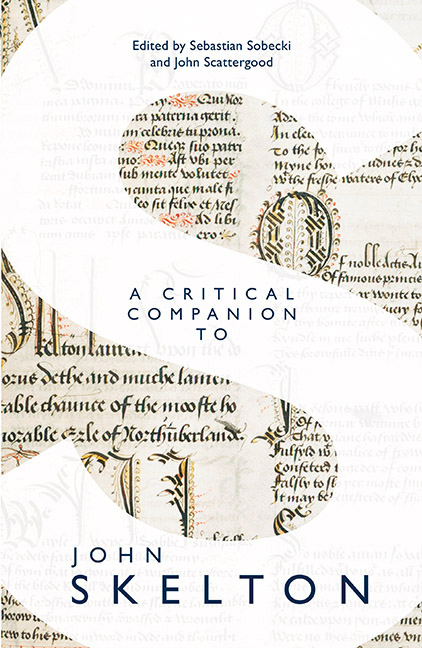Book contents
- Frontmatter
- Dedication
- Contents
- Acknowledgements
- Contributors
- Abbreviations
- Conventions
- Introduction
- 1 John Skelton (?1460–1529): A Life in Writing
- 2 Religion
- 3 Law and Politics
- 4 Classical Literature
- 5 Humanism
- 6 Satires and Invectives
- 7 Lyrics and Short Poems
- 8 Skelton's Voice and Performance
- 9 Literary Tradition
- 10 Skelton and the English Language
- 11 Skelton's English Works in Manuscripts and Print
- 12 Skelton's English Canon
- 13 Reception and Afterlife
- A Skelton Bibliography
- Index of Manuscripts
- Index of Printers and Stationers
- General Index
4 - Classical Literature
Published online by Cambridge University Press: 24 July 2019
- Frontmatter
- Dedication
- Contents
- Acknowledgements
- Contributors
- Abbreviations
- Conventions
- Introduction
- 1 John Skelton (?1460–1529): A Life in Writing
- 2 Religion
- 3 Law and Politics
- 4 Classical Literature
- 5 Humanism
- 6 Satires and Invectives
- 7 Lyrics and Short Poems
- 8 Skelton's Voice and Performance
- 9 Literary Tradition
- 10 Skelton and the English Language
- 11 Skelton's English Works in Manuscripts and Print
- 12 Skelton's English Canon
- 13 Reception and Afterlife
- A Skelton Bibliography
- Index of Manuscripts
- Index of Printers and Stationers
- General Index
Summary
Though John Skelton is commonly regarded as a quintessentially English poet, one of his earliest appearances in the literary record (in 1490) involves him with traditions of classical writing and with the act of translation – both narrowly, in the sense of rendering classical texts into English, and more generally, with the ‘carrying over’ of classical culture into England. These associations are significant, and in one way or another would stay with him, in terms mainly of Latin literature, for the rest of his life (Carlson 2016).
William Caxton, who had been translating and printing since about 1473/4, expresses some perplexity as to what linguistic register to choose for his English version of the Aeneid, based on a French translation that he had among his papers. What attracted him to the French version were ‘the fayr and honest termes and wordes in Frenshe, whyche I never sawe tofore lyke ne none so playsaunt ne so wel ordred’ (Caxton 1973: 78–81). He thought that a translation would appeal to ‘noble men … as wel for the eloquence as the hystoryes’, but when he looked over the first few pages of his version he became aware that he had adopted some of the ornate vocabulary from the French – he calls them ‘fayr and straunge termes’ – and realised that this gave him a problem with his potential readers: ‘I doubted that it sholde not please some gentylmen whiche late blamed me saying that in my translacyons I had over-curyous termes whiche coude not be understand of comyn peple and desired me to use olde and homely termes in my translacyons.’ Caxton, dutifully, looked at older documents but ‘the Englysshe was so rude and brood that I coude not wel understand it’. It was ‘more lyke to Dutche [German] than Englysshe’.
In about 1505, Skelton, through the persona of Jane Scrope, expresses something of the same disquiet about English: ‘Our natural tong is rude’, she says, and she uses adjectives such as ‘rusty’, ‘cankered’ and ‘dull’ to describe it. She says that if she were to attempt to write ‘ornatly’ she would not know where to find ‘termes to serve my mynd’ – because she has no knowledge of classical writing: ‘These poetes of auncynte …
- Type
- Chapter
- Information
- A Critical Companion to John Skelton , pp. 52 - 70Publisher: Boydell & BrewerPrint publication year: 2018



